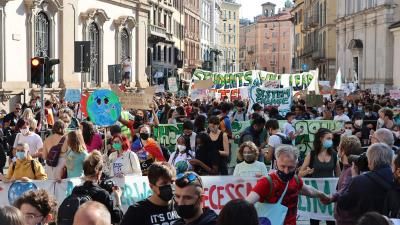Globally, almost two in five people say their country’s government doesn’t care about them
This page is approximately a 2 minute read
This page was published on

The 2021 World Risk Poll reveals that only one in five people worldwide (19%) say their government cares ‘a lot’ about their wellbeing, while around two in five said their government cares ‘somewhat’, (40%) or ‘not at all’ (37%).
These results vary widely around the world. In two regions — Central/Western Africa (56%) and Latin America/Caribbean (55%) – the majority of people said their government does not care about them at all. Meanwhile, in Central Asia (27%) and Northern Africa (30%), less than a third of people responded this way.
More than half of people in six of the 10 Eastern European countries in the study, as well as five of the 12 Southern European countries, said their government does not care about them at all. Two Balkan countries in Southern Europe – Albania (66%) and Bosnia-Herzegovina (74%) – stood out, with at least two thirds feeling that their government does not care about them at all.
A Resilient World? Understanding vulnerability in a changing climate
Read the reportConfidence in governments and infrastructure
People’s perception of whether their government cares about them is strongly related to their confidence in national institutions, including their country’s government, military, and judiciary, as well as the honesty of their elections. According to the Gallup World Poll’s National Institutions Index, Southern Asia had the highest regional score in this area (with India highest at 79.2), while confidence was lowest in Eastern Europe (with Romania lowest at 40.0) and Latin America/Caribbean (Bolivia lowest at 26.3).
When asked about satisfaction with three critical components of local infrastructure – education, healthcare, and transportation – dissatisfaction with these services was the highest in the world in Venezuela, with an average of 81% of people dissatisfied across the three areas.
The findings in Venezuela reflect the country’s socio-economic collapse and a humanitarian crisis1 that has led over six million people to leave the country since 20152. Lack of critical infrastructure has contributed to widespread food insecurity, lack of potable water for many households and sharp increases in child mortality and maternal deaths.
Other countries where people were most likely to be dissatisfied with all three aspects of these essential services include Gabon (72%), Mali (71%), and Mongolia (69%).
Dr. Sarah Cumbers Former Director of Evidence and Insight, Lloyd’s Register Foundation
Low confidence in national institutions, alongside the perception that governments do not care, poses multiple challenges for resilience.

Where do people think their government cares about them?
How much do you think your government cares about you and your wellbeing?
Download the report

A Resilient World? Understanding vulnerability in a changing climate
Revealing how people worldwide feel their country’s infrastructure and government can cope in the face of disasters, the report provides global insights into how prepared and resilient individuals believe their communities, countries and institutions are. (PDF, 5.46MB)
